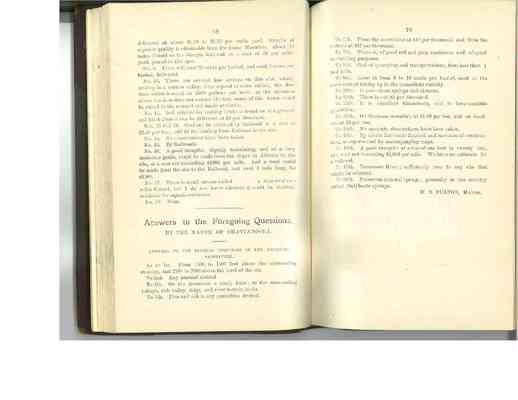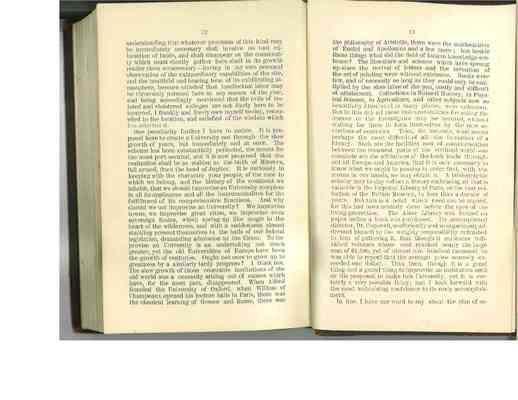Pages That Need Review
University of the South Papers Series A, No1
40
{left page} 78
delivered at about $1.50 to $1.75 per cubic yard. Granite of superior quality is obtainable from Stone Mountain, about 15 miles distant on the Georgia Railroad, at a cost of $3 per cubic yard, placed on the spot.
No. 9. Lime will cost 33 cents per bushel, and sand 4 cents per bushel, delivered.
No. 10. There are several fine springs on the site, which, uniting in a narrow valley, form a pond of some extent, the flow from which is equal to 2500 gallons per hour; as the elevation above the dam does not exceed 110 feet, much of this water could be raised to the summit and made available.
No.11. Soil suitable for making bricks is found on the ground, and brick from it can be delivered at $6 per thousand.
Nos. 12 and 13. Coal can be obtained by Railroad at a cost of $2.50 per ton; add $1 for hauling from the Railroad to the site.]
No. 14. No observations have been taken.
No. 15. By Railroads.
No. 16. A good turnpike, slightly undulating, and at a very moderate grade, could be made from the depot at Atlanta to the site, at a cost not exceeding $1800 per mile. And a road could be made from the site to the Railroad, not over 1 mile long, $1500.
No. 17. There is small stream called {blank} a little over two miles distant, but I do not know whether it could be rendered available for aquatic exercises.
No. 18. None.
Answers to the Foregoing Questions, BY THE MAYOR OF CHATTANOOGA.
ANSWERS TOT EH SEVERAL INQUIRITES OF THE LOCATING COMMITTEE.
As to 1st. From 1300 to 1500 feet above the surrounding country, and 2100 to 2300 above the level of the sea.
To 2nd. Any amount desired.
To 4th. On the mountain a sandy loam; in the surrounding valleys, rich valley, ridge, and river bottom lands.
To 5th. Pine and oak in any quantities desired.
{right page}
79
To 6th. From the mountains at $10 per thousand, and from the valleys at $16 per thousand.
To 7th. There is, of good red and grey sandstone, well adapted to building purposes.
To 8th. Cost of quarrying and transportations, from less that ¼ to 1 mile.
To 9th. Lime at from 8 to 10 cents per bushel, sand at the mere cost of taking up in the immediate vicinity.
To 10th. It can—from springs and cisterns.
To 11th. There is—at $5 per thousand.
To 12th. It is excellent bituminous, and in inexhaustible quantities.
To 13th. On Raccoon mountain at $1.80 per ton, and on Lookout at $6 per ton.
To 14th. No accurate observations have been taken.
To 15th. By divers Railroad finished and in course of construction, as represented by accompanying maps.
To 16th. A good turnpike at a rise of one foot in twenty feet, at a cost not exceeding $2,000 per mile. We have no estimate for a railroad.
To 17th. Tennessee River; sufficiently near to any site that might be selected.
To 18th. Numerous mineral springs; generally in the country called chalybeate springs.
W. D. FULTON, MAYOR.
151
72
understanding that whatever provision of this kind may be immediately necessary shall involve no vast exhaustion of funds, and shall disappear as the community which must shortly gather here shall in its growth render them unnecessary--having in my own personal observation of the extraordinary capabilities of the site, and the healthful and bracing tone of its exhilirating atmosphere, become satisfied that intellectual labor may be vigorously pursued here at any season of the year, and being accordingly convinced that the evils of isolated and cloistered colleges are not likely here to be incurred, I frankly and freely own myself to-day, reconciled to the location, and satisfied of the wisdom which has selected it.
One peculiarity further I have to notice. It is proposed here to create a University not through the slow growth of years, but immediately and at once. The scheme has been substantially perfected, the means for the most part secured, and it is now proposed that the realization shall be as sudden as the birth of Minerva, full armed, from the head of Jupiter. It is curiously in keeping with the character your people, of the race to which we belong, and the history of the continent we inhabit, that we should improvise an University complete in all its appliances and all the instrumentalites for the fulfillment of its comprehensive functions. And why should we not improvise an University? We improvise towns, we improvise great cities, we improvise even sovereign States, which spring up like magic in the heart of the wilderness, and with a suddenness almost startling present themselves in the halls of our federal legislation, demanding admission to the Union. To improvise an University is an undertaking not much greater, yet the old Universities of Europe have been the growth of centuries. Ought not ours to grow up to greatness by a similarly tardy progress? I think not. The slow growth of those venerable institutions of the old world was a necessity arising out of causes which have, for the most part, disappeared. When Alfred founded the University of Oxford, when William of Champeaux opened his lecture halls in Paris, there was the classical learning of Greece and Rome, there was
73
the philosophy of Aristotle, there were the mathematics of Euclid and Apollonius and a few more; but beside these things what did the field of human knowledge embrace? The literature and science which have sprung up since the revival of letters and the invention of the art of printing were without existence. Books were few, and of necessity so long as they could only be multiplied by the slow labor of the pen, costly and difficult of attainment. Collections in Natural History, in Physical Science, in Agriculture, and other subjects now so beautifully illustrated in many places, were unknown. But in this day all these instrumentalities for aiding the learner or the investigator may be secured, without waiting for them to form themselves by the slow accretions of centuries. Take, for instance, what seems perhaps the most difficult of all--the formation of a library. Such are the facilities now of communication between the remotest parts of the civilized world--so complete are the affiliations of the book trade throughout all Europe and America, that it is only necessary to know what we ought to prossess in order that, with the means in our hands, we may obtain it. A bibliographic scholar may to-day collect a library embracing all that is valuable in the Imperial Library at Paris, or the vast collection of the British Museum, in less than a decade of years. But this is a point which need not be argued, for this had been actually done before the eyes of the living generation. The Astor Library was formed on paper before a book was purchased. Its accomplished director, Dr. Cogswell, so efficiently and so sagaciously addressed himself to the weighty responsibility entrusted to him of gathering it, that though it embraces individual volumes whose cost reached nearly the large sum of $1,500, yet of almost one hundred thousand he was able to report that the average price scarcely exceeded one dollar. Thus then, though it is a great thing and a grand thing to improvise an institution such as itis proposed to make this University, yet it is certainly a very possible thing; and I look forward with the most undoubting confidence to its early accomplishment.
I fine, I have one word to say about the plan of or-

